Organizational Learning and Learning Organization Analysis Report
VerifiedAdded on 2022/12/27
|13
|3340
|83
Report
AI Summary
This report delves into the concepts of organizational learning and learning organizations, exploring their significance in modern business environments. It begins by defining organizational learning as the process of creating, retaining, and transferring knowledge within an organization, using Tesco as a case study. The report examines various theories of organizational learning, including behavioral, cognitive, and social cognitive theories, highlighting their roles in understanding human behavior and facilitating a learning culture. It then defines a learning organization as one that prioritizes continuous learning and adaptation. The report outlines the key traits of a learning organization, such as collaborative culture, room for innovation, knowledge sharing, and lifelong learning. Finally, it differentiates between organizational learning and learning organizations, emphasizing the importance of both for organizational success. The report concludes by emphasizing the benefits of these concepts for fostering employee development, enhancing productivity, and adapting to changing market conditions.
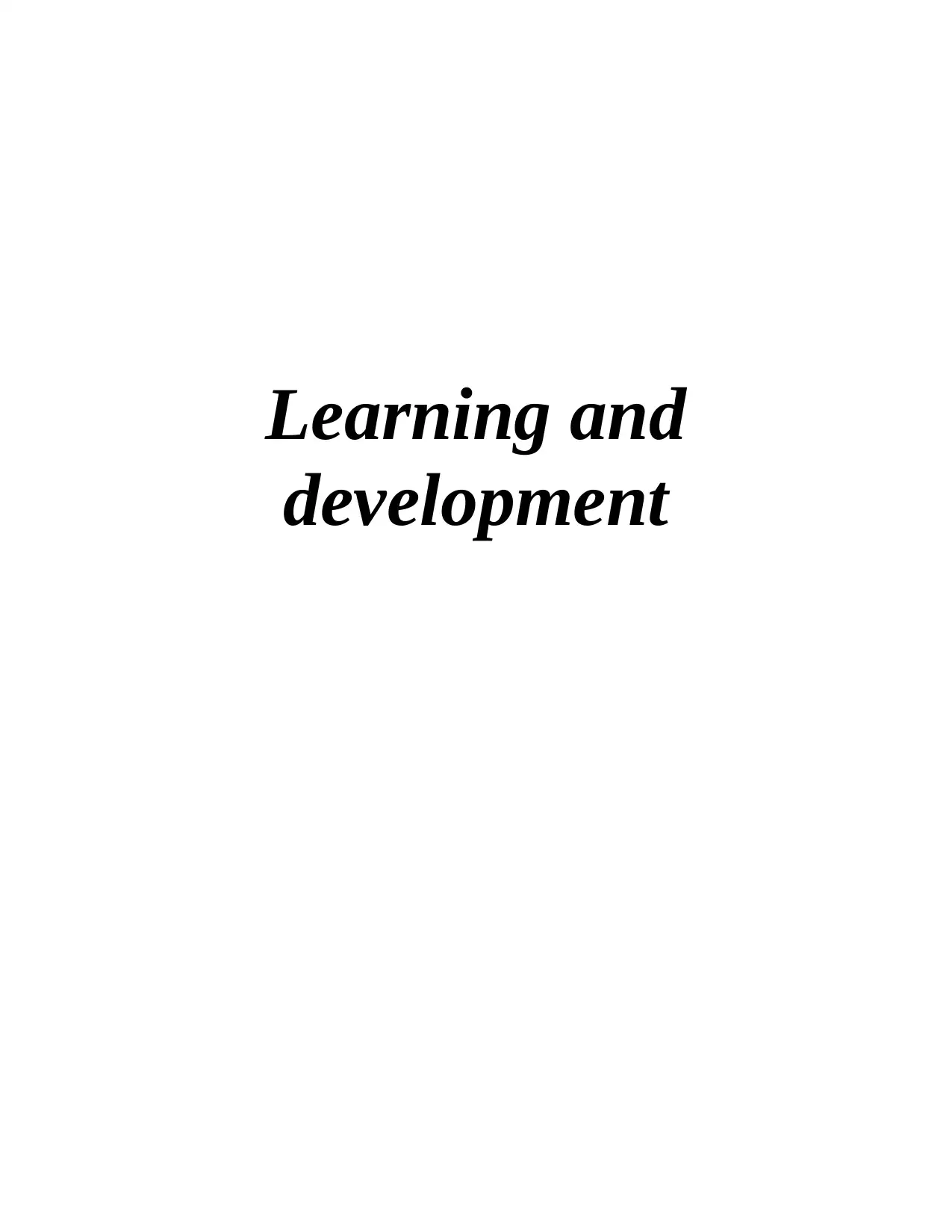
Learning and
development
development
Paraphrase This Document
Need a fresh take? Get an instant paraphrase of this document with our AI Paraphraser
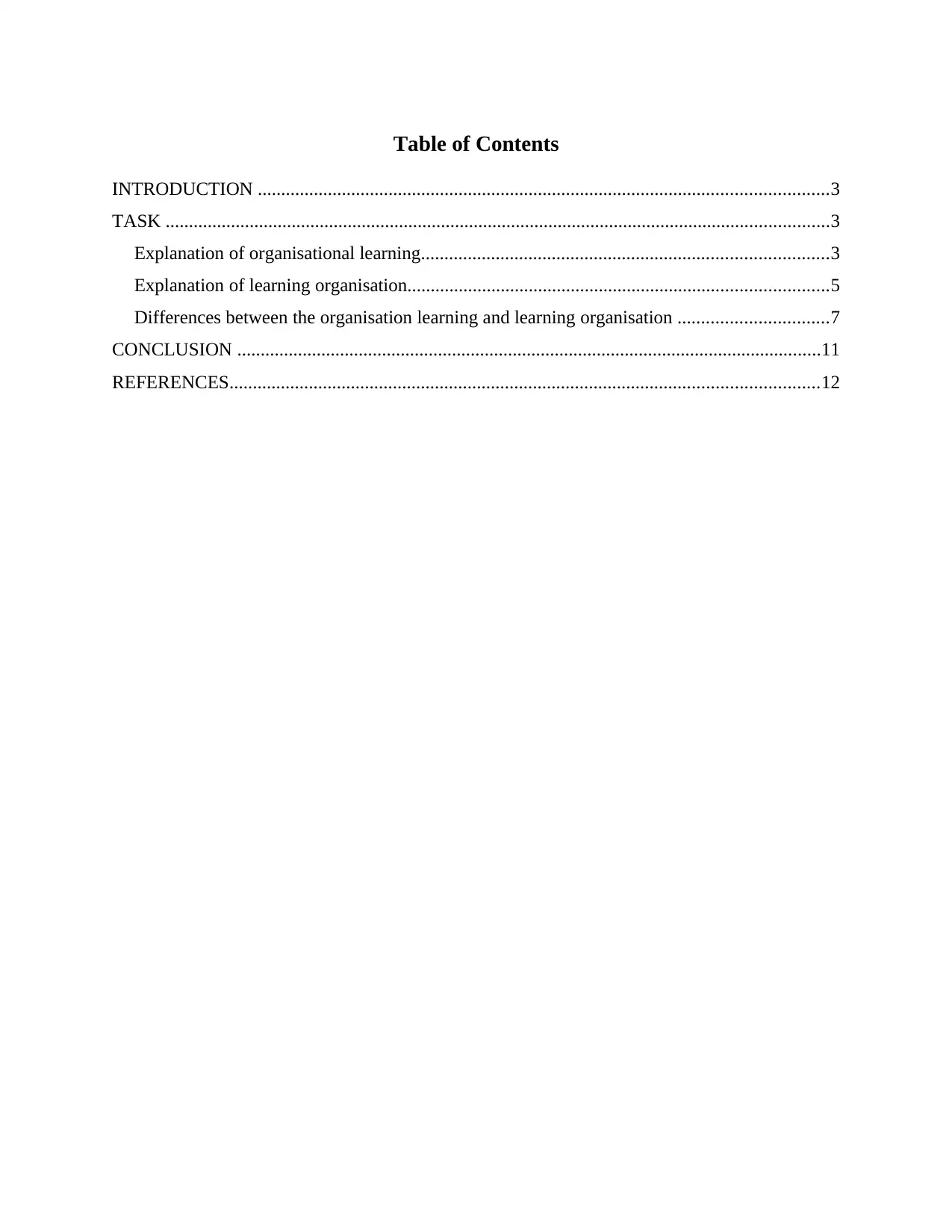
Table of Contents
INTRODUCTION ..........................................................................................................................3
TASK ..............................................................................................................................................3
Explanation of organisational learning.......................................................................................3
Explanation of learning organisation..........................................................................................5
Differences between the organisation learning and learning organisation ................................7
CONCLUSION .............................................................................................................................11
REFERENCES..............................................................................................................................12
INTRODUCTION ..........................................................................................................................3
TASK ..............................................................................................................................................3
Explanation of organisational learning.......................................................................................3
Explanation of learning organisation..........................................................................................5
Differences between the organisation learning and learning organisation ................................7
CONCLUSION .............................................................................................................................11
REFERENCES..............................................................................................................................12
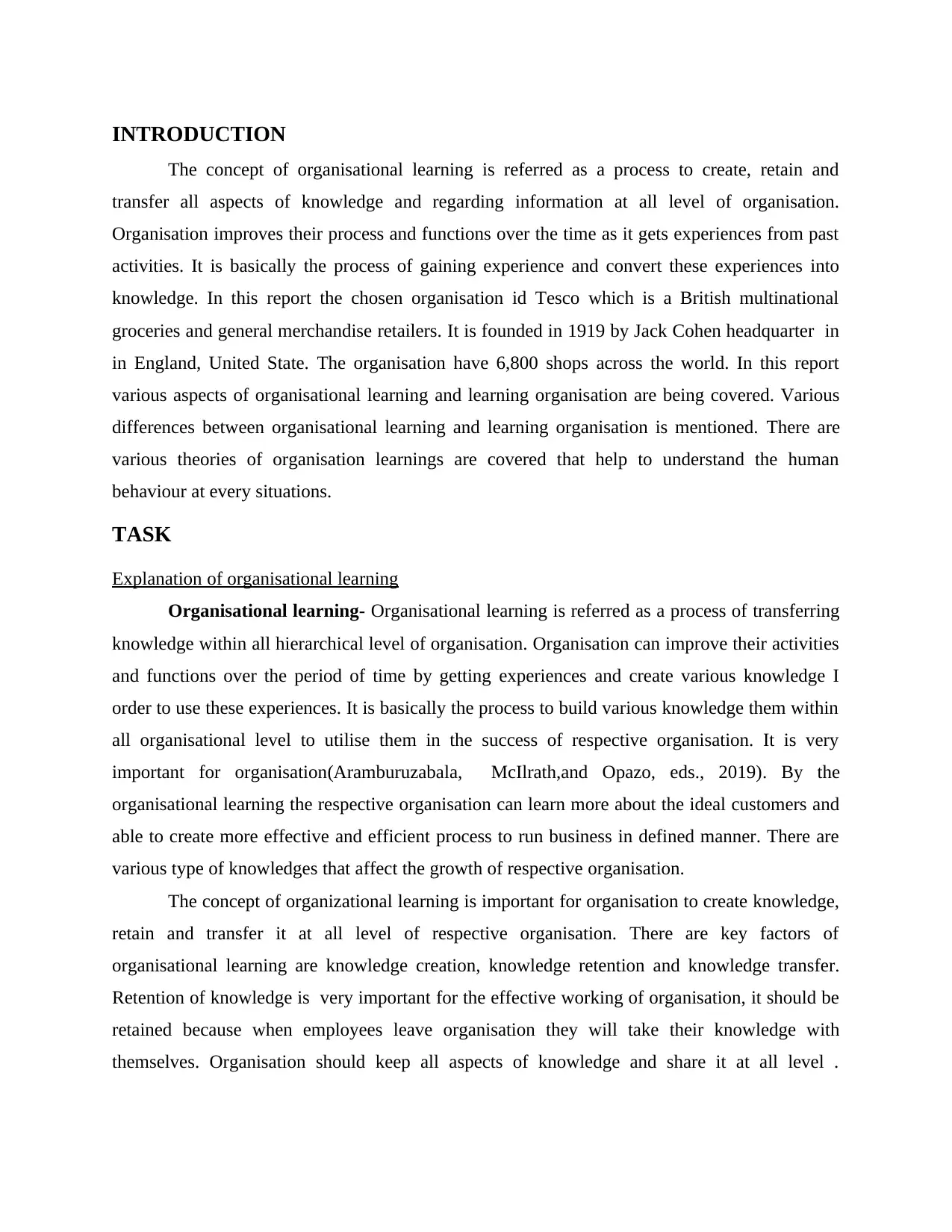
INTRODUCTION
The concept of organisational learning is referred as a process to create, retain and
transfer all aspects of knowledge and regarding information at all level of organisation.
Organisation improves their process and functions over the time as it gets experiences from past
activities. It is basically the process of gaining experience and convert these experiences into
knowledge. In this report the chosen organisation id Tesco which is a British multinational
groceries and general merchandise retailers. It is founded in 1919 by Jack Cohen headquarter in
in England, United State. The organisation have 6,800 shops across the world. In this report
various aspects of organisational learning and learning organisation are being covered. Various
differences between organisational learning and learning organisation is mentioned. There are
various theories of organisation learnings are covered that help to understand the human
behaviour at every situations.
TASK
Explanation of organisational learning
Organisational learning- Organisational learning is referred as a process of transferring
knowledge within all hierarchical level of organisation. Organisation can improve their activities
and functions over the period of time by getting experiences and create various knowledge I
order to use these experiences. It is basically the process to build various knowledge them within
all organisational level to utilise them in the success of respective organisation. It is very
important for organisation(Aramburuzabala, McIlrath,and Opazo, eds., 2019). By the
organisational learning the respective organisation can learn more about the ideal customers and
able to create more effective and efficient process to run business in defined manner. There are
various type of knowledges that affect the growth of respective organisation.
The concept of organizational learning is important for organisation to create knowledge,
retain and transfer it at all level of respective organisation. There are key factors of
organisational learning are knowledge creation, knowledge retention and knowledge transfer.
Retention of knowledge is very important for the effective working of organisation, it should be
retained because when employees leave organisation they will take their knowledge with
themselves. Organisation should keep all aspects of knowledge and share it at all level .
The concept of organisational learning is referred as a process to create, retain and
transfer all aspects of knowledge and regarding information at all level of organisation.
Organisation improves their process and functions over the time as it gets experiences from past
activities. It is basically the process of gaining experience and convert these experiences into
knowledge. In this report the chosen organisation id Tesco which is a British multinational
groceries and general merchandise retailers. It is founded in 1919 by Jack Cohen headquarter in
in England, United State. The organisation have 6,800 shops across the world. In this report
various aspects of organisational learning and learning organisation are being covered. Various
differences between organisational learning and learning organisation is mentioned. There are
various theories of organisation learnings are covered that help to understand the human
behaviour at every situations.
TASK
Explanation of organisational learning
Organisational learning- Organisational learning is referred as a process of transferring
knowledge within all hierarchical level of organisation. Organisation can improve their activities
and functions over the period of time by getting experiences and create various knowledge I
order to use these experiences. It is basically the process to build various knowledge them within
all organisational level to utilise them in the success of respective organisation. It is very
important for organisation(Aramburuzabala, McIlrath,and Opazo, eds., 2019). By the
organisational learning the respective organisation can learn more about the ideal customers and
able to create more effective and efficient process to run business in defined manner. There are
various type of knowledges that affect the growth of respective organisation.
The concept of organizational learning is important for organisation to create knowledge,
retain and transfer it at all level of respective organisation. There are key factors of
organisational learning are knowledge creation, knowledge retention and knowledge transfer.
Retention of knowledge is very important for the effective working of organisation, it should be
retained because when employees leave organisation they will take their knowledge with
themselves. Organisation should keep all aspects of knowledge and share it at all level .
⊘ This is a preview!⊘
Do you want full access?
Subscribe today to unlock all pages.

Trusted by 1+ million students worldwide
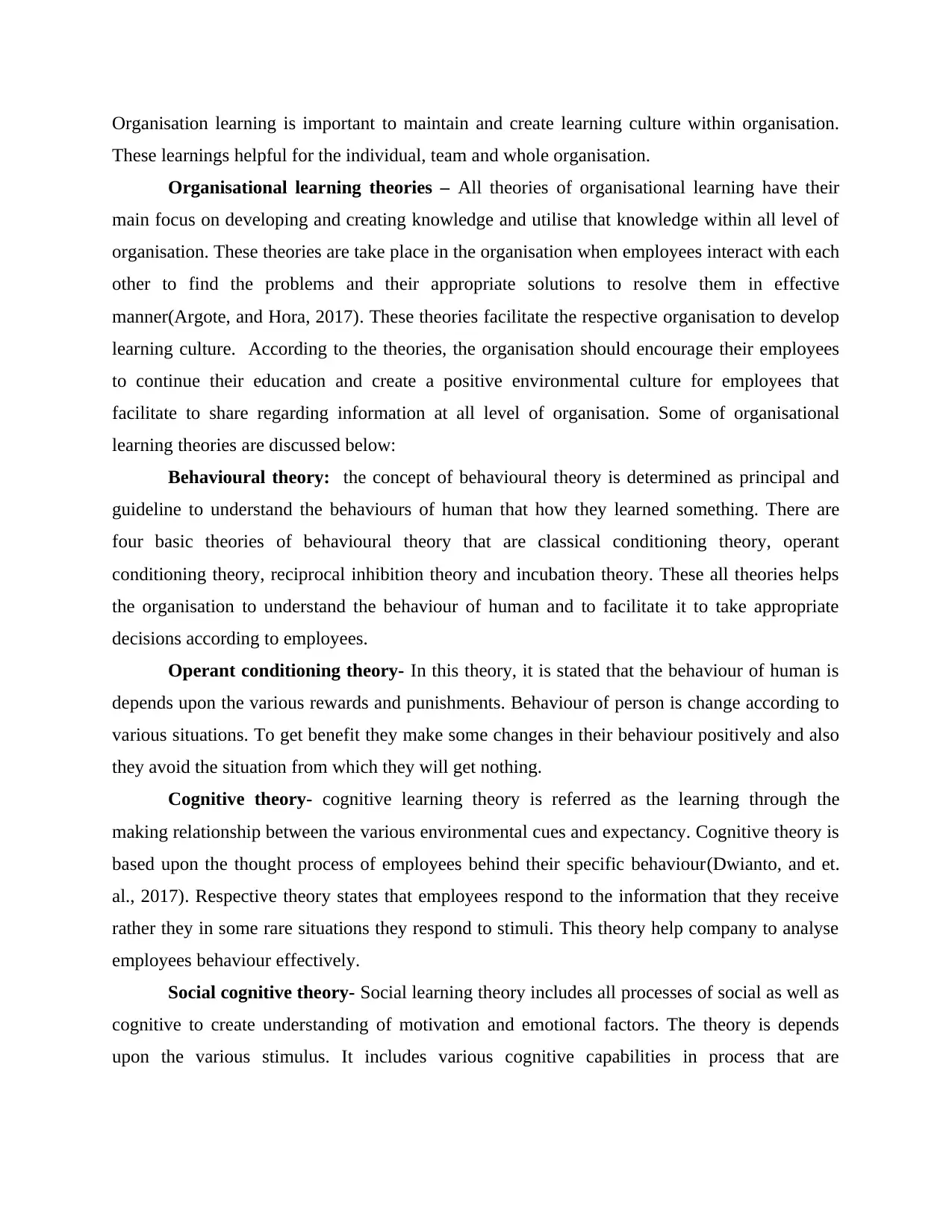
Organisation learning is important to maintain and create learning culture within organisation.
These learnings helpful for the individual, team and whole organisation.
Organisational learning theories – All theories of organisational learning have their
main focus on developing and creating knowledge and utilise that knowledge within all level of
organisation. These theories are take place in the organisation when employees interact with each
other to find the problems and their appropriate solutions to resolve them in effective
manner(Argote, and Hora, 2017). These theories facilitate the respective organisation to develop
learning culture. According to the theories, the organisation should encourage their employees
to continue their education and create a positive environmental culture for employees that
facilitate to share regarding information at all level of organisation. Some of organisational
learning theories are discussed below:
Behavioural theory: the concept of behavioural theory is determined as principal and
guideline to understand the behaviours of human that how they learned something. There are
four basic theories of behavioural theory that are classical conditioning theory, operant
conditioning theory, reciprocal inhibition theory and incubation theory. These all theories helps
the organisation to understand the behaviour of human and to facilitate it to take appropriate
decisions according to employees.
Operant conditioning theory- In this theory, it is stated that the behaviour of human is
depends upon the various rewards and punishments. Behaviour of person is change according to
various situations. To get benefit they make some changes in their behaviour positively and also
they avoid the situation from which they will get nothing.
Cognitive theory- cognitive learning theory is referred as the learning through the
making relationship between the various environmental cues and expectancy. Cognitive theory is
based upon the thought process of employees behind their specific behaviour(Dwianto, and et.
al., 2017). Respective theory states that employees respond to the information that they receive
rather they in some rare situations they respond to stimuli. This theory help company to analyse
employees behaviour effectively.
Social cognitive theory- Social learning theory includes all processes of social as well as
cognitive to create understanding of motivation and emotional factors. The theory is depends
upon the various stimulus. It includes various cognitive capabilities in process that are
These learnings helpful for the individual, team and whole organisation.
Organisational learning theories – All theories of organisational learning have their
main focus on developing and creating knowledge and utilise that knowledge within all level of
organisation. These theories are take place in the organisation when employees interact with each
other to find the problems and their appropriate solutions to resolve them in effective
manner(Argote, and Hora, 2017). These theories facilitate the respective organisation to develop
learning culture. According to the theories, the organisation should encourage their employees
to continue their education and create a positive environmental culture for employees that
facilitate to share regarding information at all level of organisation. Some of organisational
learning theories are discussed below:
Behavioural theory: the concept of behavioural theory is determined as principal and
guideline to understand the behaviours of human that how they learned something. There are
four basic theories of behavioural theory that are classical conditioning theory, operant
conditioning theory, reciprocal inhibition theory and incubation theory. These all theories helps
the organisation to understand the behaviour of human and to facilitate it to take appropriate
decisions according to employees.
Operant conditioning theory- In this theory, it is stated that the behaviour of human is
depends upon the various rewards and punishments. Behaviour of person is change according to
various situations. To get benefit they make some changes in their behaviour positively and also
they avoid the situation from which they will get nothing.
Cognitive theory- cognitive learning theory is referred as the learning through the
making relationship between the various environmental cues and expectancy. Cognitive theory is
based upon the thought process of employees behind their specific behaviour(Dwianto, and et.
al., 2017). Respective theory states that employees respond to the information that they receive
rather they in some rare situations they respond to stimuli. This theory help company to analyse
employees behaviour effectively.
Social cognitive theory- Social learning theory includes all processes of social as well as
cognitive to create understanding of motivation and emotional factors. The theory is depends
upon the various stimulus. It includes various cognitive capabilities in process that are
Paraphrase This Document
Need a fresh take? Get an instant paraphrase of this document with our AI Paraphraser
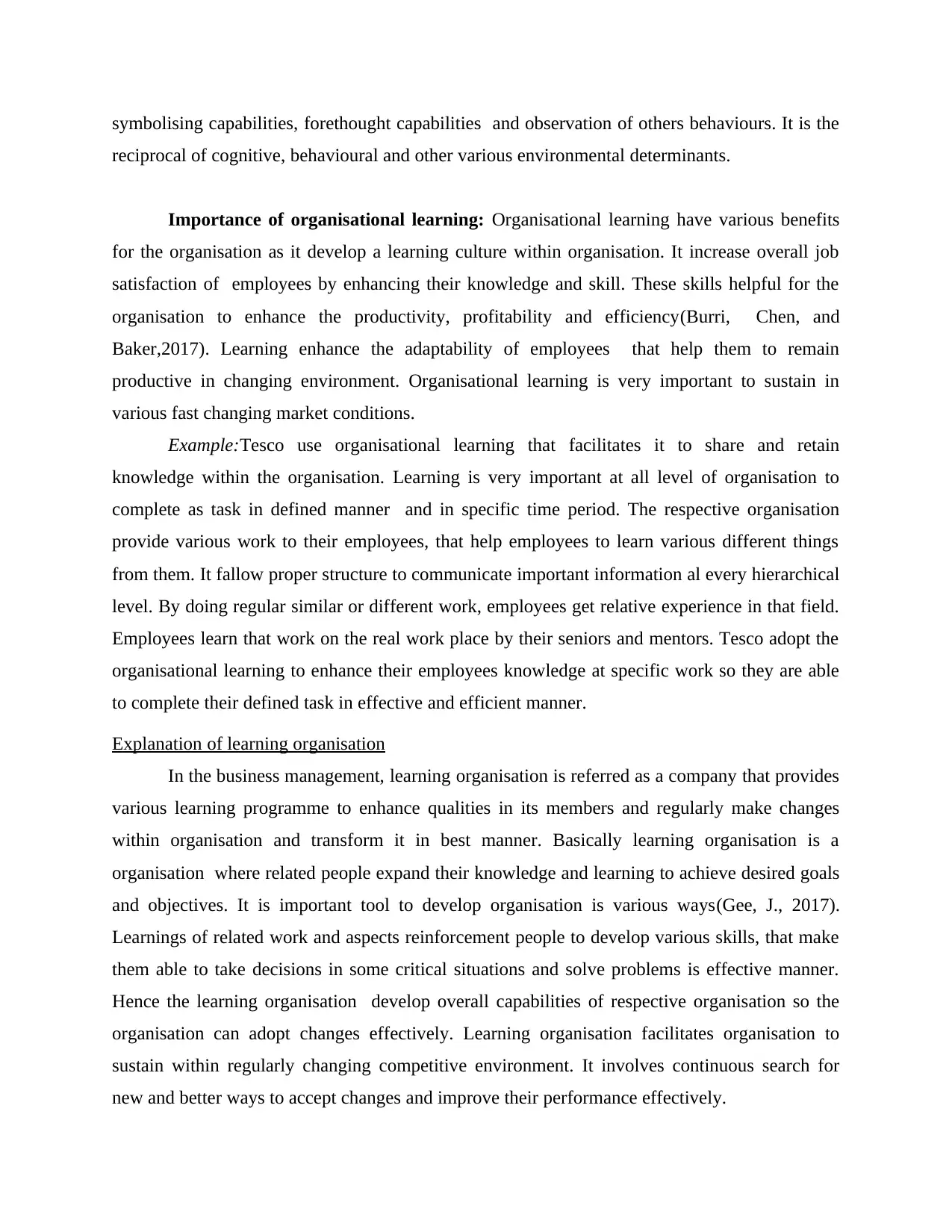
symbolising capabilities, forethought capabilities and observation of others behaviours. It is the
reciprocal of cognitive, behavioural and other various environmental determinants.
Importance of organisational learning: Organisational learning have various benefits
for the organisation as it develop a learning culture within organisation. It increase overall job
satisfaction of employees by enhancing their knowledge and skill. These skills helpful for the
organisation to enhance the productivity, profitability and efficiency(Burri, Chen, and
Baker,2017). Learning enhance the adaptability of employees that help them to remain
productive in changing environment. Organisational learning is very important to sustain in
various fast changing market conditions.
Example:Tesco use organisational learning that facilitates it to share and retain
knowledge within the organisation. Learning is very important at all level of organisation to
complete as task in defined manner and in specific time period. The respective organisation
provide various work to their employees, that help employees to learn various different things
from them. It fallow proper structure to communicate important information al every hierarchical
level. By doing regular similar or different work, employees get relative experience in that field.
Employees learn that work on the real work place by their seniors and mentors. Tesco adopt the
organisational learning to enhance their employees knowledge at specific work so they are able
to complete their defined task in effective and efficient manner.
Explanation of learning organisation
In the business management, learning organisation is referred as a company that provides
various learning programme to enhance qualities in its members and regularly make changes
within organisation and transform it in best manner. Basically learning organisation is a
organisation where related people expand their knowledge and learning to achieve desired goals
and objectives. It is important tool to develop organisation is various ways(Gee, J., 2017).
Learnings of related work and aspects reinforcement people to develop various skills, that make
them able to take decisions in some critical situations and solve problems is effective manner.
Hence the learning organisation develop overall capabilities of respective organisation so the
organisation can adopt changes effectively. Learning organisation facilitates organisation to
sustain within regularly changing competitive environment. It involves continuous search for
new and better ways to accept changes and improve their performance effectively.
reciprocal of cognitive, behavioural and other various environmental determinants.
Importance of organisational learning: Organisational learning have various benefits
for the organisation as it develop a learning culture within organisation. It increase overall job
satisfaction of employees by enhancing their knowledge and skill. These skills helpful for the
organisation to enhance the productivity, profitability and efficiency(Burri, Chen, and
Baker,2017). Learning enhance the adaptability of employees that help them to remain
productive in changing environment. Organisational learning is very important to sustain in
various fast changing market conditions.
Example:Tesco use organisational learning that facilitates it to share and retain
knowledge within the organisation. Learning is very important at all level of organisation to
complete as task in defined manner and in specific time period. The respective organisation
provide various work to their employees, that help employees to learn various different things
from them. It fallow proper structure to communicate important information al every hierarchical
level. By doing regular similar or different work, employees get relative experience in that field.
Employees learn that work on the real work place by their seniors and mentors. Tesco adopt the
organisational learning to enhance their employees knowledge at specific work so they are able
to complete their defined task in effective and efficient manner.
Explanation of learning organisation
In the business management, learning organisation is referred as a company that provides
various learning programme to enhance qualities in its members and regularly make changes
within organisation and transform it in best manner. Basically learning organisation is a
organisation where related people expand their knowledge and learning to achieve desired goals
and objectives. It is important tool to develop organisation is various ways(Gee, J., 2017).
Learnings of related work and aspects reinforcement people to develop various skills, that make
them able to take decisions in some critical situations and solve problems is effective manner.
Hence the learning organisation develop overall capabilities of respective organisation so the
organisation can adopt changes effectively. Learning organisation facilitates organisation to
sustain within regularly changing competitive environment. It involves continuous search for
new and better ways to accept changes and improve their performance effectively.
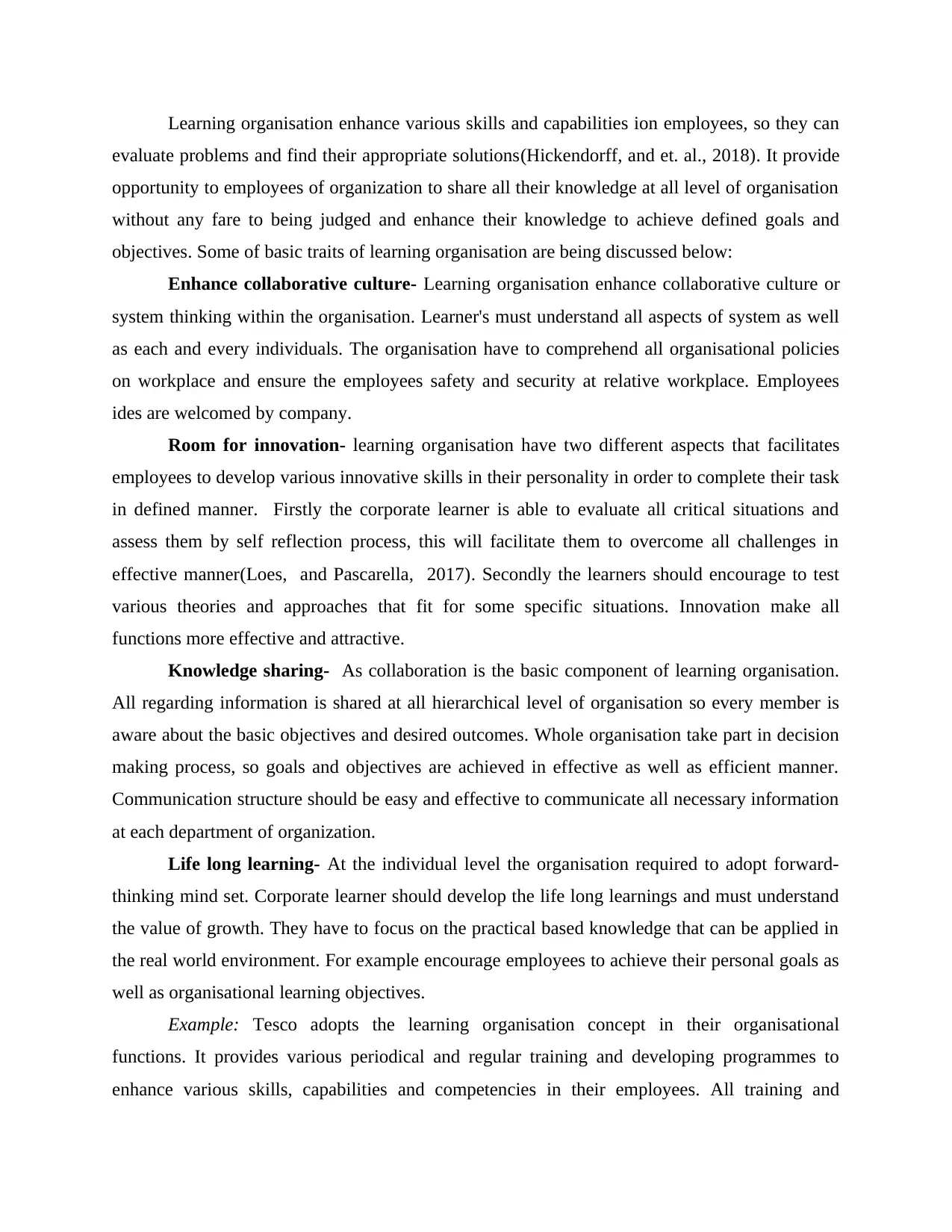
Learning organisation enhance various skills and capabilities ion employees, so they can
evaluate problems and find their appropriate solutions(Hickendorff, and et. al., 2018). It provide
opportunity to employees of organization to share all their knowledge at all level of organisation
without any fare to being judged and enhance their knowledge to achieve defined goals and
objectives. Some of basic traits of learning organisation are being discussed below:
Enhance collaborative culture- Learning organisation enhance collaborative culture or
system thinking within the organisation. Learner's must understand all aspects of system as well
as each and every individuals. The organisation have to comprehend all organisational policies
on workplace and ensure the employees safety and security at relative workplace. Employees
ides are welcomed by company.
Room for innovation- learning organisation have two different aspects that facilitates
employees to develop various innovative skills in their personality in order to complete their task
in defined manner. Firstly the corporate learner is able to evaluate all critical situations and
assess them by self reflection process, this will facilitate them to overcome all challenges in
effective manner(Loes, and Pascarella, 2017). Secondly the learners should encourage to test
various theories and approaches that fit for some specific situations. Innovation make all
functions more effective and attractive.
Knowledge sharing- As collaboration is the basic component of learning organisation.
All regarding information is shared at all hierarchical level of organisation so every member is
aware about the basic objectives and desired outcomes. Whole organisation take part in decision
making process, so goals and objectives are achieved in effective as well as efficient manner.
Communication structure should be easy and effective to communicate all necessary information
at each department of organization.
Life long learning- At the individual level the organisation required to adopt forward-
thinking mind set. Corporate learner should develop the life long learnings and must understand
the value of growth. They have to focus on the practical based knowledge that can be applied in
the real world environment. For example encourage employees to achieve their personal goals as
well as organisational learning objectives.
Example: Tesco adopts the learning organisation concept in their organisational
functions. It provides various periodical and regular training and developing programmes to
enhance various skills, capabilities and competencies in their employees. All training and
evaluate problems and find their appropriate solutions(Hickendorff, and et. al., 2018). It provide
opportunity to employees of organization to share all their knowledge at all level of organisation
without any fare to being judged and enhance their knowledge to achieve defined goals and
objectives. Some of basic traits of learning organisation are being discussed below:
Enhance collaborative culture- Learning organisation enhance collaborative culture or
system thinking within the organisation. Learner's must understand all aspects of system as well
as each and every individuals. The organisation have to comprehend all organisational policies
on workplace and ensure the employees safety and security at relative workplace. Employees
ides are welcomed by company.
Room for innovation- learning organisation have two different aspects that facilitates
employees to develop various innovative skills in their personality in order to complete their task
in defined manner. Firstly the corporate learner is able to evaluate all critical situations and
assess them by self reflection process, this will facilitate them to overcome all challenges in
effective manner(Loes, and Pascarella, 2017). Secondly the learners should encourage to test
various theories and approaches that fit for some specific situations. Innovation make all
functions more effective and attractive.
Knowledge sharing- As collaboration is the basic component of learning organisation.
All regarding information is shared at all hierarchical level of organisation so every member is
aware about the basic objectives and desired outcomes. Whole organisation take part in decision
making process, so goals and objectives are achieved in effective as well as efficient manner.
Communication structure should be easy and effective to communicate all necessary information
at each department of organization.
Life long learning- At the individual level the organisation required to adopt forward-
thinking mind set. Corporate learner should develop the life long learnings and must understand
the value of growth. They have to focus on the practical based knowledge that can be applied in
the real world environment. For example encourage employees to achieve their personal goals as
well as organisational learning objectives.
Example: Tesco adopts the learning organisation concept in their organisational
functions. It provides various periodical and regular training and developing programmes to
enhance various skills, capabilities and competencies in their employees. All training and
⊘ This is a preview!⊘
Do you want full access?
Subscribe today to unlock all pages.

Trusted by 1+ million students worldwide
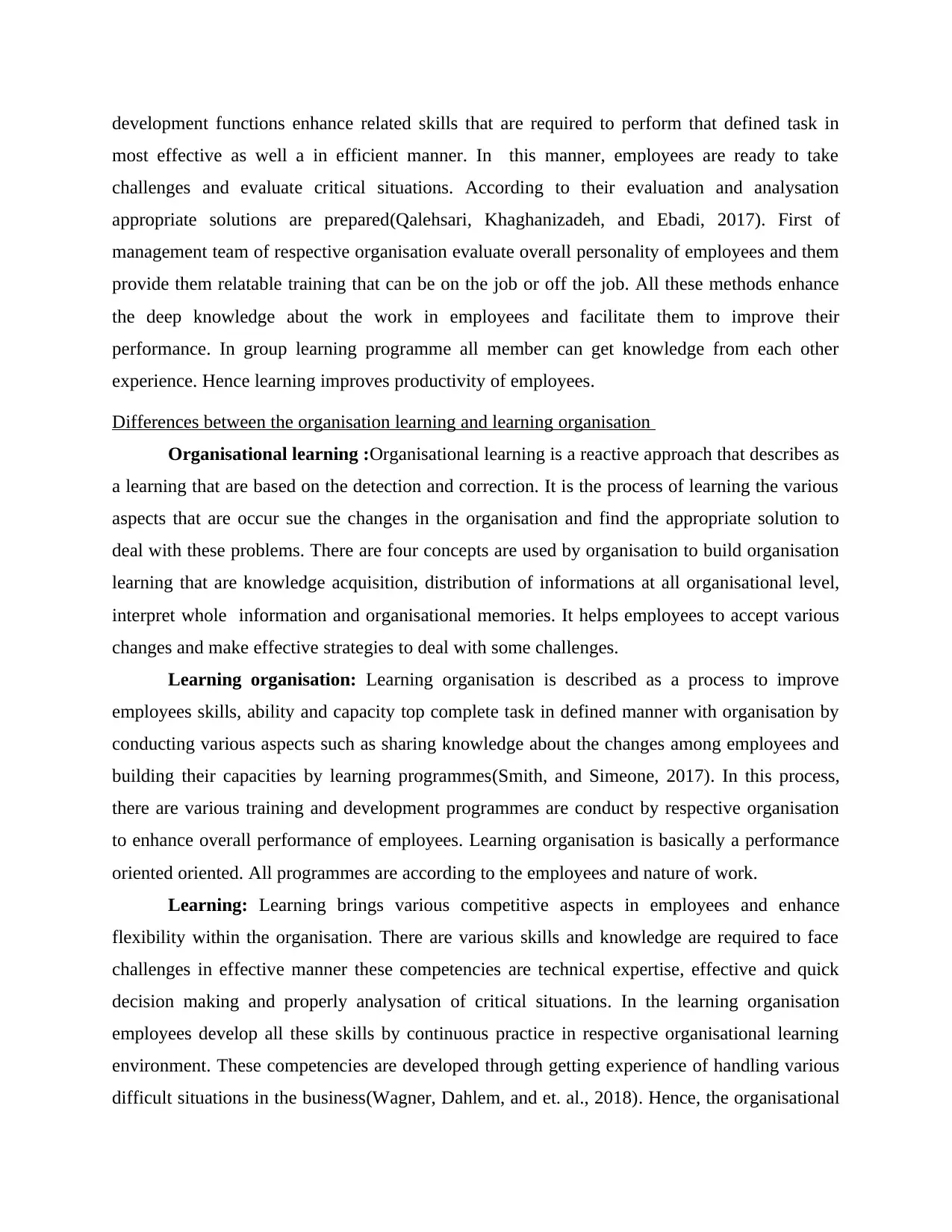
development functions enhance related skills that are required to perform that defined task in
most effective as well a in efficient manner. In this manner, employees are ready to take
challenges and evaluate critical situations. According to their evaluation and analysation
appropriate solutions are prepared(Qalehsari, Khaghanizadeh, and Ebadi, 2017). First of
management team of respective organisation evaluate overall personality of employees and them
provide them relatable training that can be on the job or off the job. All these methods enhance
the deep knowledge about the work in employees and facilitate them to improve their
performance. In group learning programme all member can get knowledge from each other
experience. Hence learning improves productivity of employees.
Differences between the organisation learning and learning organisation
Organisational learning :Organisational learning is a reactive approach that describes as
a learning that are based on the detection and correction. It is the process of learning the various
aspects that are occur sue the changes in the organisation and find the appropriate solution to
deal with these problems. There are four concepts are used by organisation to build organisation
learning that are knowledge acquisition, distribution of informations at all organisational level,
interpret whole information and organisational memories. It helps employees to accept various
changes and make effective strategies to deal with some challenges.
Learning organisation: Learning organisation is described as a process to improve
employees skills, ability and capacity top complete task in defined manner with organisation by
conducting various aspects such as sharing knowledge about the changes among employees and
building their capacities by learning programmes(Smith, and Simeone, 2017). In this process,
there are various training and development programmes are conduct by respective organisation
to enhance overall performance of employees. Learning organisation is basically a performance
oriented oriented. All programmes are according to the employees and nature of work.
Learning: Learning brings various competitive aspects in employees and enhance
flexibility within the organisation. There are various skills and knowledge are required to face
challenges in effective manner these competencies are technical expertise, effective and quick
decision making and properly analysation of critical situations. In the learning organisation
employees develop all these skills by continuous practice in respective organisational learning
environment. These competencies are developed through getting experience of handling various
difficult situations in the business(Wagner, Dahlem, and et. al., 2018). Hence, the organisational
most effective as well a in efficient manner. In this manner, employees are ready to take
challenges and evaluate critical situations. According to their evaluation and analysation
appropriate solutions are prepared(Qalehsari, Khaghanizadeh, and Ebadi, 2017). First of
management team of respective organisation evaluate overall personality of employees and them
provide them relatable training that can be on the job or off the job. All these methods enhance
the deep knowledge about the work in employees and facilitate them to improve their
performance. In group learning programme all member can get knowledge from each other
experience. Hence learning improves productivity of employees.
Differences between the organisation learning and learning organisation
Organisational learning :Organisational learning is a reactive approach that describes as
a learning that are based on the detection and correction. It is the process of learning the various
aspects that are occur sue the changes in the organisation and find the appropriate solution to
deal with these problems. There are four concepts are used by organisation to build organisation
learning that are knowledge acquisition, distribution of informations at all organisational level,
interpret whole information and organisational memories. It helps employees to accept various
changes and make effective strategies to deal with some challenges.
Learning organisation: Learning organisation is described as a process to improve
employees skills, ability and capacity top complete task in defined manner with organisation by
conducting various aspects such as sharing knowledge about the changes among employees and
building their capacities by learning programmes(Smith, and Simeone, 2017). In this process,
there are various training and development programmes are conduct by respective organisation
to enhance overall performance of employees. Learning organisation is basically a performance
oriented oriented. All programmes are according to the employees and nature of work.
Learning: Learning brings various competitive aspects in employees and enhance
flexibility within the organisation. There are various skills and knowledge are required to face
challenges in effective manner these competencies are technical expertise, effective and quick
decision making and properly analysation of critical situations. In the learning organisation
employees develop all these skills by continuous practice in respective organisational learning
environment. These competencies are developed through getting experience of handling various
difficult situations in the business(Wagner, Dahlem, and et. al., 2018). Hence, the organisational
Paraphrase This Document
Need a fresh take? Get an instant paraphrase of this document with our AI Paraphraser
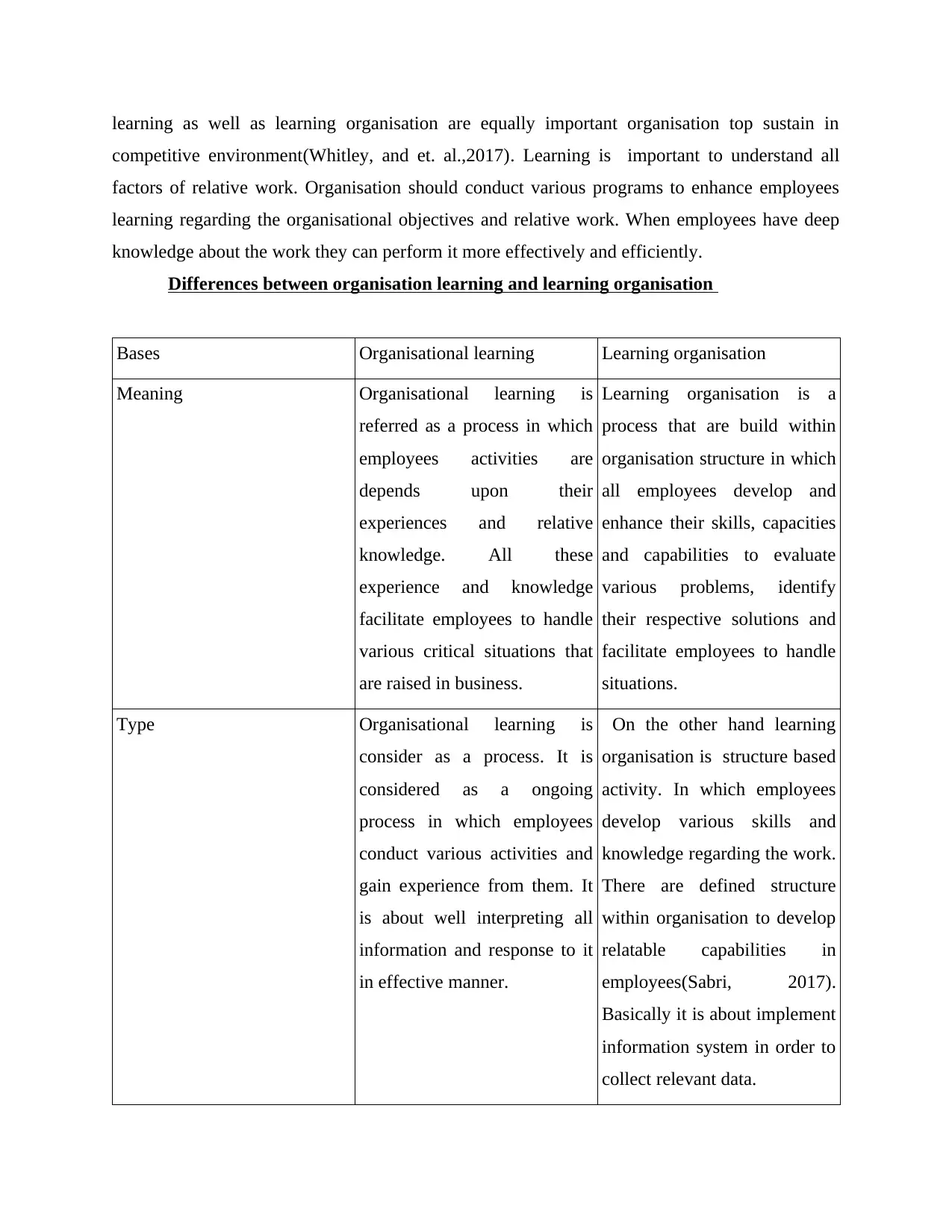
learning as well as learning organisation are equally important organisation top sustain in
competitive environment(Whitley, and et. al.,2017). Learning is important to understand all
factors of relative work. Organisation should conduct various programs to enhance employees
learning regarding the organisational objectives and relative work. When employees have deep
knowledge about the work they can perform it more effectively and efficiently.
Differences between organisation learning and learning organisation
Bases Organisational learning Learning organisation
Meaning Organisational learning is
referred as a process in which
employees activities are
depends upon their
experiences and relative
knowledge. All these
experience and knowledge
facilitate employees to handle
various critical situations that
are raised in business.
Learning organisation is a
process that are build within
organisation structure in which
all employees develop and
enhance their skills, capacities
and capabilities to evaluate
various problems, identify
their respective solutions and
facilitate employees to handle
situations.
Type Organisational learning is
consider as a process. It is
considered as a ongoing
process in which employees
conduct various activities and
gain experience from them. It
is about well interpreting all
information and response to it
in effective manner.
On the other hand learning
organisation is structure based
activity. In which employees
develop various skills and
knowledge regarding the work.
There are defined structure
within organisation to develop
relatable capabilities in
employees(Sabri, 2017).
Basically it is about implement
information system in order to
collect relevant data.
competitive environment(Whitley, and et. al.,2017). Learning is important to understand all
factors of relative work. Organisation should conduct various programs to enhance employees
learning regarding the organisational objectives and relative work. When employees have deep
knowledge about the work they can perform it more effectively and efficiently.
Differences between organisation learning and learning organisation
Bases Organisational learning Learning organisation
Meaning Organisational learning is
referred as a process in which
employees activities are
depends upon their
experiences and relative
knowledge. All these
experience and knowledge
facilitate employees to handle
various critical situations that
are raised in business.
Learning organisation is a
process that are build within
organisation structure in which
all employees develop and
enhance their skills, capacities
and capabilities to evaluate
various problems, identify
their respective solutions and
facilitate employees to handle
situations.
Type Organisational learning is
consider as a process. It is
considered as a ongoing
process in which employees
conduct various activities and
gain experience from them. It
is about well interpreting all
information and response to it
in effective manner.
On the other hand learning
organisation is structure based
activity. In which employees
develop various skills and
knowledge regarding the work.
There are defined structure
within organisation to develop
relatable capabilities in
employees(Sabri, 2017).
Basically it is about implement
information system in order to
collect relevant data.
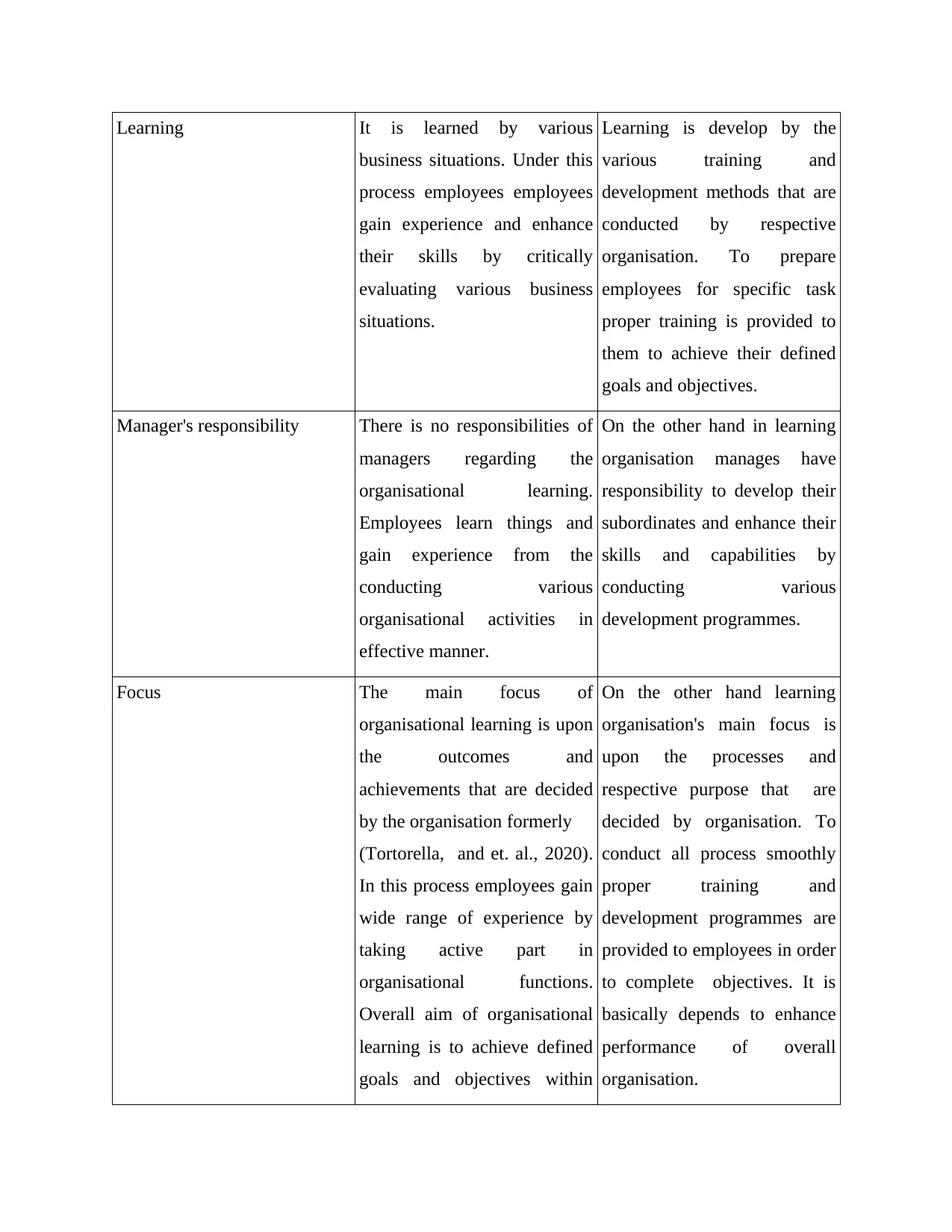
Learning It is learned by various
business situations. Under this
process employees employees
gain experience and enhance
their skills by critically
evaluating various business
situations.
Learning is develop by the
various training and
development methods that are
conducted by respective
organisation. To prepare
employees for specific task
proper training is provided to
them to achieve their defined
goals and objectives.
Manager's responsibility There is no responsibilities of
managers regarding the
organisational learning.
Employees learn things and
gain experience from the
conducting various
organisational activities in
effective manner.
On the other hand in learning
organisation manages have
responsibility to develop their
subordinates and enhance their
skills and capabilities by
conducting various
development programmes.
Focus The main focus of
organisational learning is upon
the outcomes and
achievements that are decided
by the organisation formerly
(Tortorella, and et. al., 2020).
In this process employees gain
wide range of experience by
taking active part in
organisational functions.
Overall aim of organisational
learning is to achieve defined
goals and objectives within
On the other hand learning
organisation's main focus is
upon the processes and
respective purpose that are
decided by organisation. To
conduct all process smoothly
proper training and
development programmes are
provided to employees in order
to complete objectives. It is
basically depends to enhance
performance of overall
organisation.
business situations. Under this
process employees employees
gain experience and enhance
their skills by critically
evaluating various business
situations.
Learning is develop by the
various training and
development methods that are
conducted by respective
organisation. To prepare
employees for specific task
proper training is provided to
them to achieve their defined
goals and objectives.
Manager's responsibility There is no responsibilities of
managers regarding the
organisational learning.
Employees learn things and
gain experience from the
conducting various
organisational activities in
effective manner.
On the other hand in learning
organisation manages have
responsibility to develop their
subordinates and enhance their
skills and capabilities by
conducting various
development programmes.
Focus The main focus of
organisational learning is upon
the outcomes and
achievements that are decided
by the organisation formerly
(Tortorella, and et. al., 2020).
In this process employees gain
wide range of experience by
taking active part in
organisational functions.
Overall aim of organisational
learning is to achieve defined
goals and objectives within
On the other hand learning
organisation's main focus is
upon the processes and
respective purpose that are
decided by organisation. To
conduct all process smoothly
proper training and
development programmes are
provided to employees in order
to complete objectives. It is
basically depends to enhance
performance of overall
organisation.
⊘ This is a preview!⊘
Do you want full access?
Subscribe today to unlock all pages.

Trusted by 1+ million students worldwide
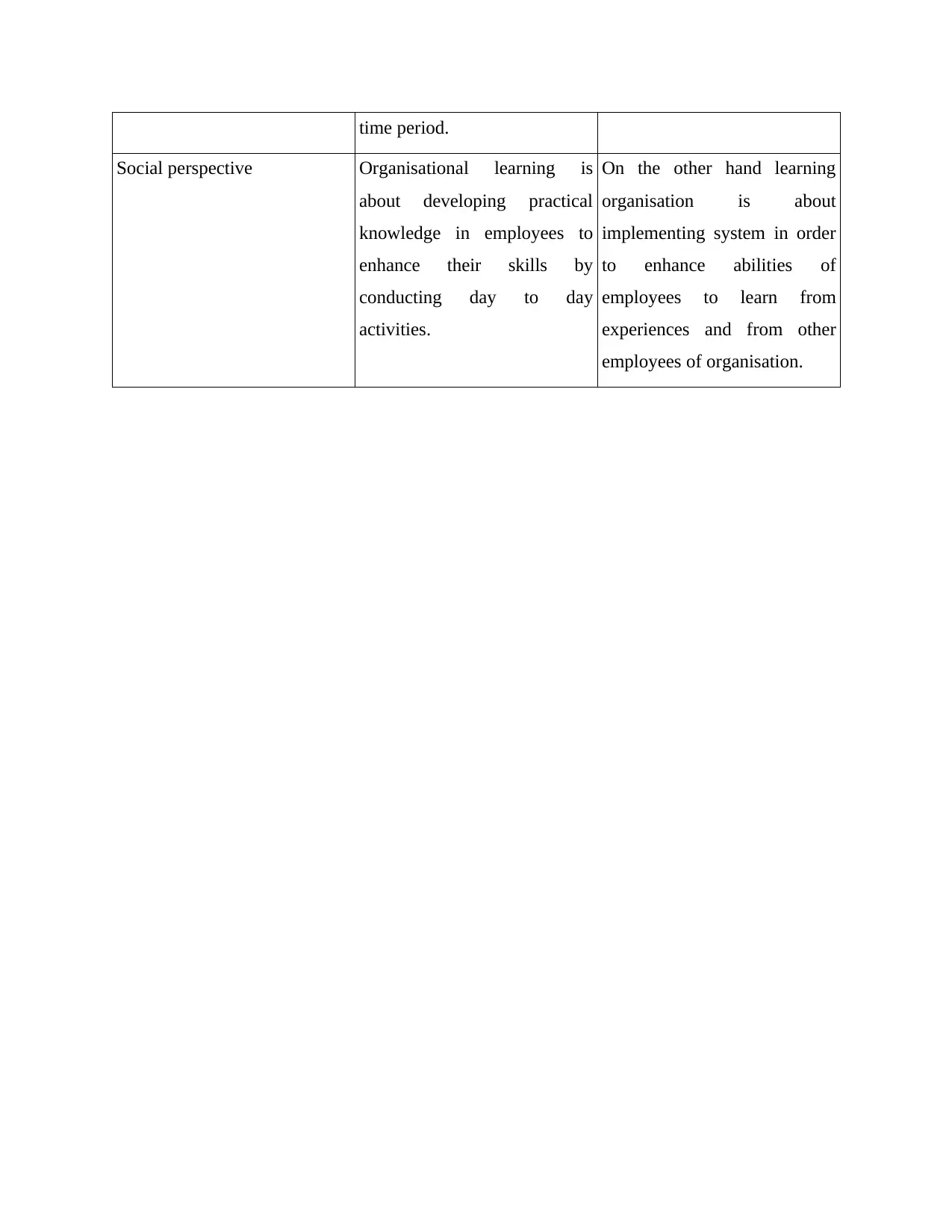
time period.
Social perspective Organisational learning is
about developing practical
knowledge in employees to
enhance their skills by
conducting day to day
activities.
On the other hand learning
organisation is about
implementing system in order
to enhance abilities of
employees to learn from
experiences and from other
employees of organisation.
Social perspective Organisational learning is
about developing practical
knowledge in employees to
enhance their skills by
conducting day to day
activities.
On the other hand learning
organisation is about
implementing system in order
to enhance abilities of
employees to learn from
experiences and from other
employees of organisation.
Paraphrase This Document
Need a fresh take? Get an instant paraphrase of this document with our AI Paraphraser
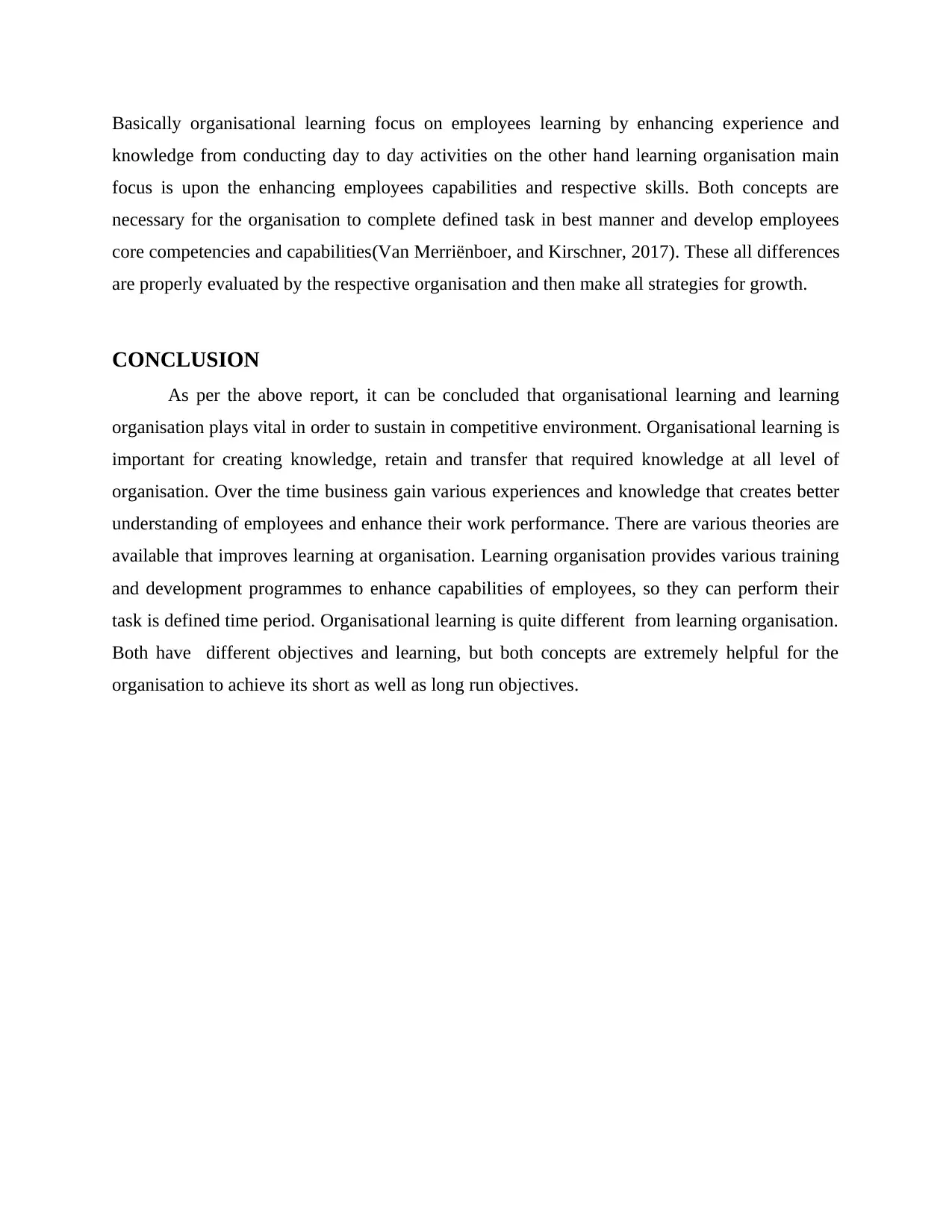
Basically organisational learning focus on employees learning by enhancing experience and
knowledge from conducting day to day activities on the other hand learning organisation main
focus is upon the enhancing employees capabilities and respective skills. Both concepts are
necessary for the organisation to complete defined task in best manner and develop employees
core competencies and capabilities(Van Merriënboer, and Kirschner, 2017). These all differences
are properly evaluated by the respective organisation and then make all strategies for growth.
CONCLUSION
As per the above report, it can be concluded that organisational learning and learning
organisation plays vital in order to sustain in competitive environment. Organisational learning is
important for creating knowledge, retain and transfer that required knowledge at all level of
organisation. Over the time business gain various experiences and knowledge that creates better
understanding of employees and enhance their work performance. There are various theories are
available that improves learning at organisation. Learning organisation provides various training
and development programmes to enhance capabilities of employees, so they can perform their
task is defined time period. Organisational learning is quite different from learning organisation.
Both have different objectives and learning, but both concepts are extremely helpful for the
organisation to achieve its short as well as long run objectives.
knowledge from conducting day to day activities on the other hand learning organisation main
focus is upon the enhancing employees capabilities and respective skills. Both concepts are
necessary for the organisation to complete defined task in best manner and develop employees
core competencies and capabilities(Van Merriënboer, and Kirschner, 2017). These all differences
are properly evaluated by the respective organisation and then make all strategies for growth.
CONCLUSION
As per the above report, it can be concluded that organisational learning and learning
organisation plays vital in order to sustain in competitive environment. Organisational learning is
important for creating knowledge, retain and transfer that required knowledge at all level of
organisation. Over the time business gain various experiences and knowledge that creates better
understanding of employees and enhance their work performance. There are various theories are
available that improves learning at organisation. Learning organisation provides various training
and development programmes to enhance capabilities of employees, so they can perform their
task is defined time period. Organisational learning is quite different from learning organisation.
Both have different objectives and learning, but both concepts are extremely helpful for the
organisation to achieve its short as well as long run objectives.
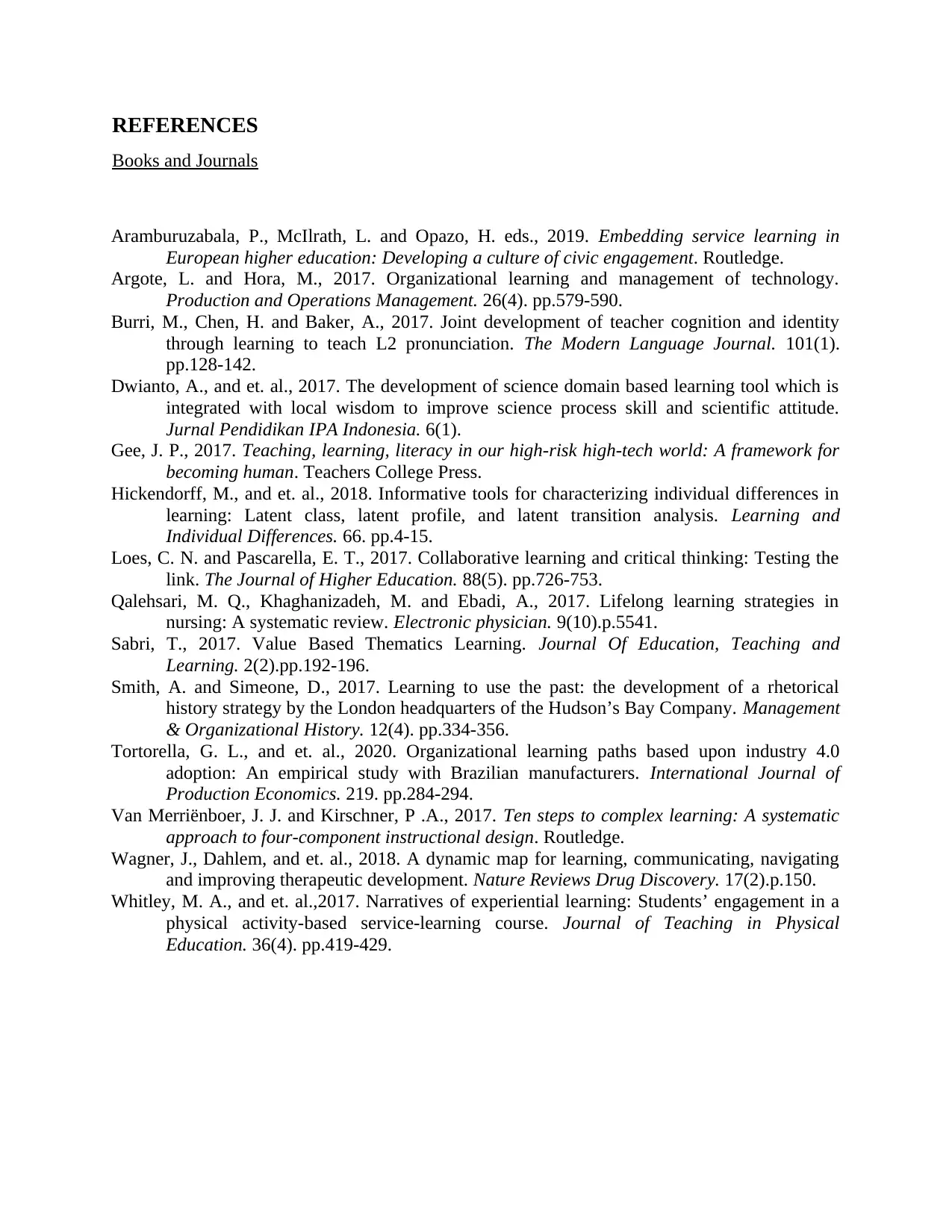
REFERENCES
Books and Journals
Aramburuzabala, P., McIlrath, L. and Opazo, H. eds., 2019. Embedding service learning in
European higher education: Developing a culture of civic engagement. Routledge.
Argote, L. and Hora, M., 2017. Organizational learning and management of technology.
Production and Operations Management. 26(4). pp.579-590.
Burri, M., Chen, H. and Baker, A., 2017. Joint development of teacher cognition and identity
through learning to teach L2 pronunciation. The Modern Language Journal. 101(1).
pp.128-142.
Dwianto, A., and et. al., 2017. The development of science domain based learning tool which is
integrated with local wisdom to improve science process skill and scientific attitude.
Jurnal Pendidikan IPA Indonesia. 6(1).
Gee, J. P., 2017. Teaching, learning, literacy in our high-risk high-tech world: A framework for
becoming human. Teachers College Press.
Hickendorff, M., and et. al., 2018. Informative tools for characterizing individual differences in
learning: Latent class, latent profile, and latent transition analysis. Learning and
Individual Differences. 66. pp.4-15.
Loes, C. N. and Pascarella, E. T., 2017. Collaborative learning and critical thinking: Testing the
link. The Journal of Higher Education. 88(5). pp.726-753.
Qalehsari, M. Q., Khaghanizadeh, M. and Ebadi, A., 2017. Lifelong learning strategies in
nursing: A systematic review. Electronic physician. 9(10).p.5541.
Sabri, T., 2017. Value Based Thematics Learning. Journal Of Education, Teaching and
Learning. 2(2).pp.192-196.
Smith, A. and Simeone, D., 2017. Learning to use the past: the development of a rhetorical
history strategy by the London headquarters of the Hudson’s Bay Company. Management
& Organizational History. 12(4). pp.334-356.
Tortorella, G. L., and et. al., 2020. Organizational learning paths based upon industry 4.0
adoption: An empirical study with Brazilian manufacturers. International Journal of
Production Economics. 219. pp.284-294.
Van Merriënboer, J. J. and Kirschner, P .A., 2017. Ten steps to complex learning: A systematic
approach to four-component instructional design. Routledge.
Wagner, J., Dahlem, and et. al., 2018. A dynamic map for learning, communicating, navigating
and improving therapeutic development. Nature Reviews Drug Discovery. 17(2).p.150.
Whitley, M. A., and et. al.,2017. Narratives of experiential learning: Students’ engagement in a
physical activity-based service-learning course. Journal of Teaching in Physical
Education. 36(4). pp.419-429.
Books and Journals
Aramburuzabala, P., McIlrath, L. and Opazo, H. eds., 2019. Embedding service learning in
European higher education: Developing a culture of civic engagement. Routledge.
Argote, L. and Hora, M., 2017. Organizational learning and management of technology.
Production and Operations Management. 26(4). pp.579-590.
Burri, M., Chen, H. and Baker, A., 2017. Joint development of teacher cognition and identity
through learning to teach L2 pronunciation. The Modern Language Journal. 101(1).
pp.128-142.
Dwianto, A., and et. al., 2017. The development of science domain based learning tool which is
integrated with local wisdom to improve science process skill and scientific attitude.
Jurnal Pendidikan IPA Indonesia. 6(1).
Gee, J. P., 2017. Teaching, learning, literacy in our high-risk high-tech world: A framework for
becoming human. Teachers College Press.
Hickendorff, M., and et. al., 2018. Informative tools for characterizing individual differences in
learning: Latent class, latent profile, and latent transition analysis. Learning and
Individual Differences. 66. pp.4-15.
Loes, C. N. and Pascarella, E. T., 2017. Collaborative learning and critical thinking: Testing the
link. The Journal of Higher Education. 88(5). pp.726-753.
Qalehsari, M. Q., Khaghanizadeh, M. and Ebadi, A., 2017. Lifelong learning strategies in
nursing: A systematic review. Electronic physician. 9(10).p.5541.
Sabri, T., 2017. Value Based Thematics Learning. Journal Of Education, Teaching and
Learning. 2(2).pp.192-196.
Smith, A. and Simeone, D., 2017. Learning to use the past: the development of a rhetorical
history strategy by the London headquarters of the Hudson’s Bay Company. Management
& Organizational History. 12(4). pp.334-356.
Tortorella, G. L., and et. al., 2020. Organizational learning paths based upon industry 4.0
adoption: An empirical study with Brazilian manufacturers. International Journal of
Production Economics. 219. pp.284-294.
Van Merriënboer, J. J. and Kirschner, P .A., 2017. Ten steps to complex learning: A systematic
approach to four-component instructional design. Routledge.
Wagner, J., Dahlem, and et. al., 2018. A dynamic map for learning, communicating, navigating
and improving therapeutic development. Nature Reviews Drug Discovery. 17(2).p.150.
Whitley, M. A., and et. al.,2017. Narratives of experiential learning: Students’ engagement in a
physical activity-based service-learning course. Journal of Teaching in Physical
Education. 36(4). pp.419-429.
⊘ This is a preview!⊘
Do you want full access?
Subscribe today to unlock all pages.

Trusted by 1+ million students worldwide
1 out of 13
Related Documents
Your All-in-One AI-Powered Toolkit for Academic Success.
+13062052269
info@desklib.com
Available 24*7 on WhatsApp / Email
![[object Object]](/_next/static/media/star-bottom.7253800d.svg)
Unlock your academic potential
Copyright © 2020–2026 A2Z Services. All Rights Reserved. Developed and managed by ZUCOL.




